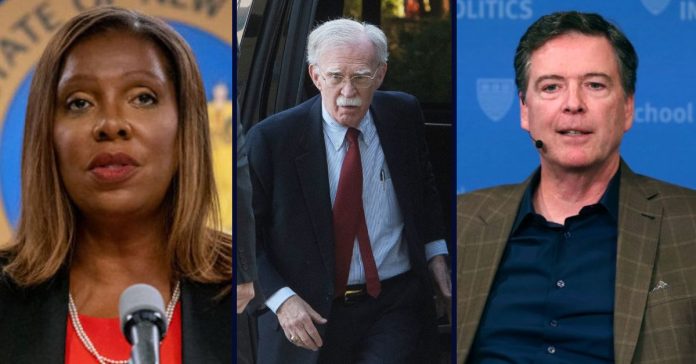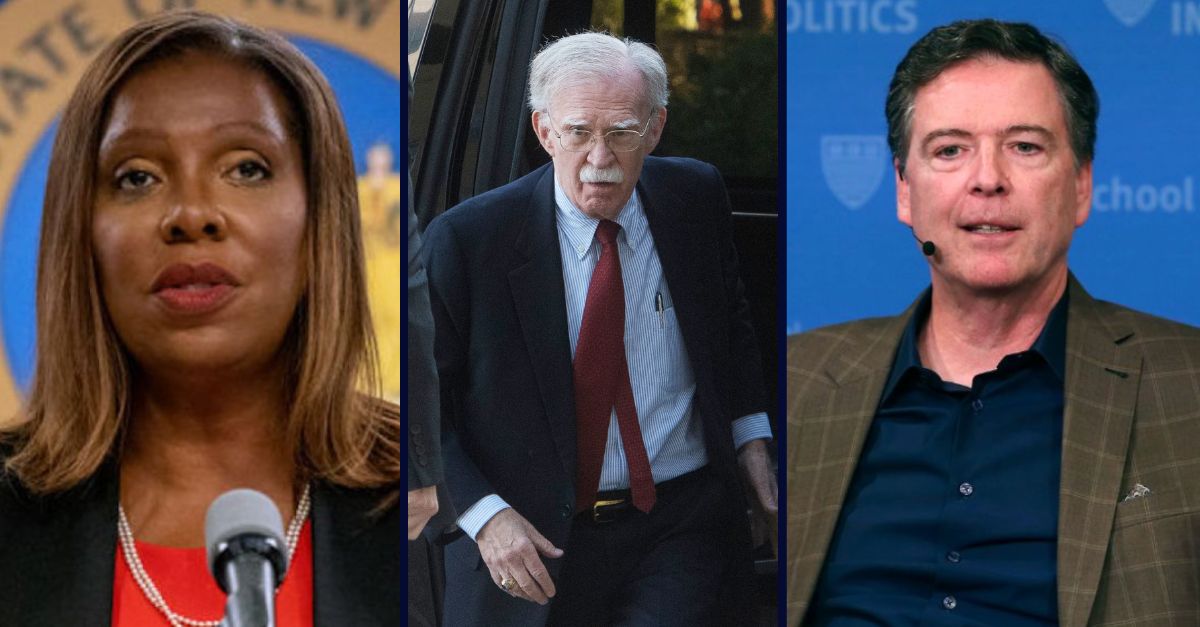
Left: New York Attorney General Letitia James speaks during a press conference regarding former US President Donald Trump and his family”s financial fraud case on September 21, 2022 in New York (photo by YUKI IWAMURA/AFP via Getty Images). Center: Former Trump administration national security adviser John Bolton, arrives for his arraignment at the Greenbelt Federal Courthouse in Greenbelt, Md., Friday, Oct. 17, 2025 (AP Photo/Rod Lamkey, Jr.). Right: Former FBI director James Comey gestures while speaking at Harvard University’s Institute of Politics’ JFK Jr. Forum in Cambridge, Mass., Feb. 24, 2020. (AP Photo/Charles Krupa, File).
After news broke Thursday that notorious GOP hawk and former national security adviser John Bolton was slapped with 18 charges for alleged mishandling of classified information, he was quick to claim he’s merely being persecuted by former Espionage Act defendant President Donald Trump, much like former FBI Director James Comey and New York Attorney General Letitia James. But there are a number of reasons why Bolton could be in more serious legal peril, no matter what he says about being on Trump’s enemies list.
The charges themselves
Lying to Congress, as Comey is accused of, and lying to a bank to secure a more favorable mortgage rate, as AG James is alleged to have done, are both serious offenses if proven beyond a reasonable doubt. In neither case, however, is the government accusing them of jeopardizing the nation’s national security and defense.
At its core, that is what the Bolton indictment is about. And Bolton’s indictment, spanning 26 pages, is far more detailed — whether about the Yale-trained lawyer’s knowledge of his legal duty not to share classified information without authorization, given the various nondisclosure agreements he had to sign, or his past slams of former Secretary of State Hillary Clinton’s use of a private email server and Defense Secretary Pete Hegseth’s Signalgate.
“Look, as I’ve said before, I believe it still to this day. If I had done at the State Department what Hillary Clinton did, I’d be wearing an orange jumpsuit now,” Bolton was quoted telling Lou Dobbs on Fox Business in 2017.
“When you’re on Signal, did no one in that conversation for days ever say you know maybe we ought to get off this get back on a classified system … It just. I’m just, without words, to understand how that could have happened,” Bolton said as recently as March.
Bolton allegedly shared over 1,000 pages of “diary-like” details with two relatives at home in Maryland and stored or transmitted classified information on or through AOL and Gmail accounts, including after his stint as national security advisor ended in 2019 — as he worked on the tell-all book “The Room Where It Happened.”
The loose handling of top secret information, the government also alleged, made Bolton a relatively easy target for an Iranian hacker.
Compare that to the handful of paragraphs in Comey’s indictment, or the claim that James’ alleged fraud netted her roughly $19,000 in “ill-gotten gains.”
The prosecutors on the case
While it is true that Trump reacted to the Bolton indictment by calling him a “bad guy” who essentially got what was coming to him, the genesis of the indictment appears much more regular than the circumstances surrounding the Comey and James indictments.
In the latter two cases, the defendants have opportunities to challenge the legitimacy of the role of Lindsey Halligan, the former Trump defense attorney with no prosecutorial experience turned interim U.S. attorney who brought — and signed — those indictments all on her own, despite the beliefs of career prosecutors that the evidence wasn’t sufficient and just weeks after the president expressly called for U.S. Attorney General Pam Bondi to prosecute Comey and James.
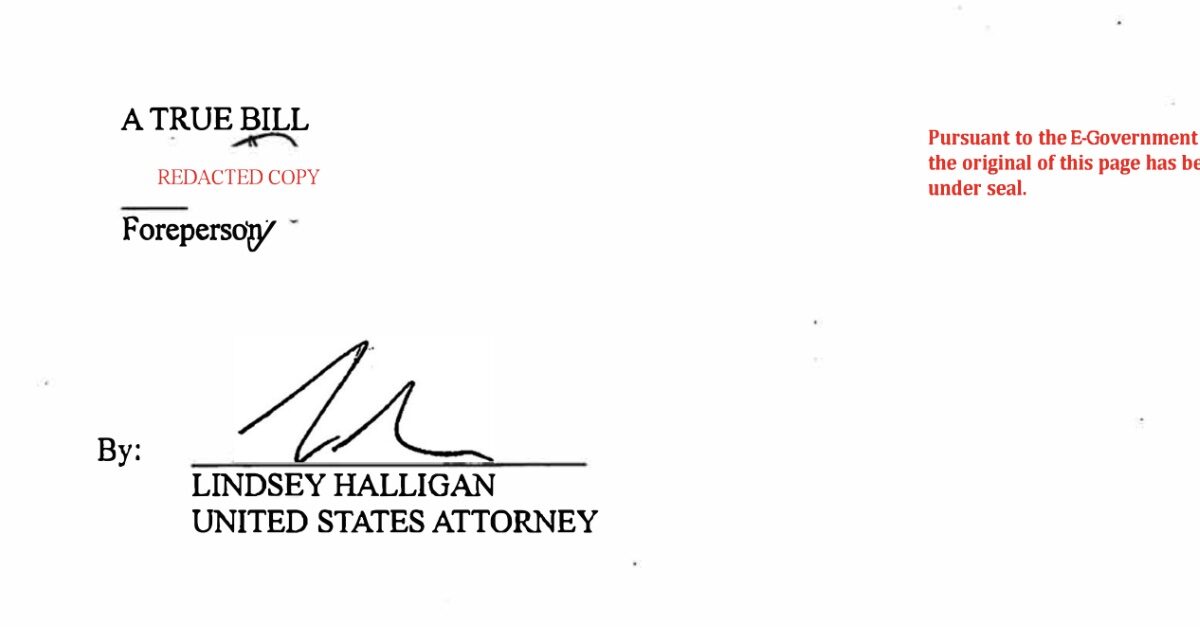
Lindsey Halligan alone signs Letitia James’ indictment (court documents).
Taken together, these details may tend to aid selective or vindictive prosecution arguments, though it’s unclear if those historically difficult showings will ultimately succeed in tossing those cases.
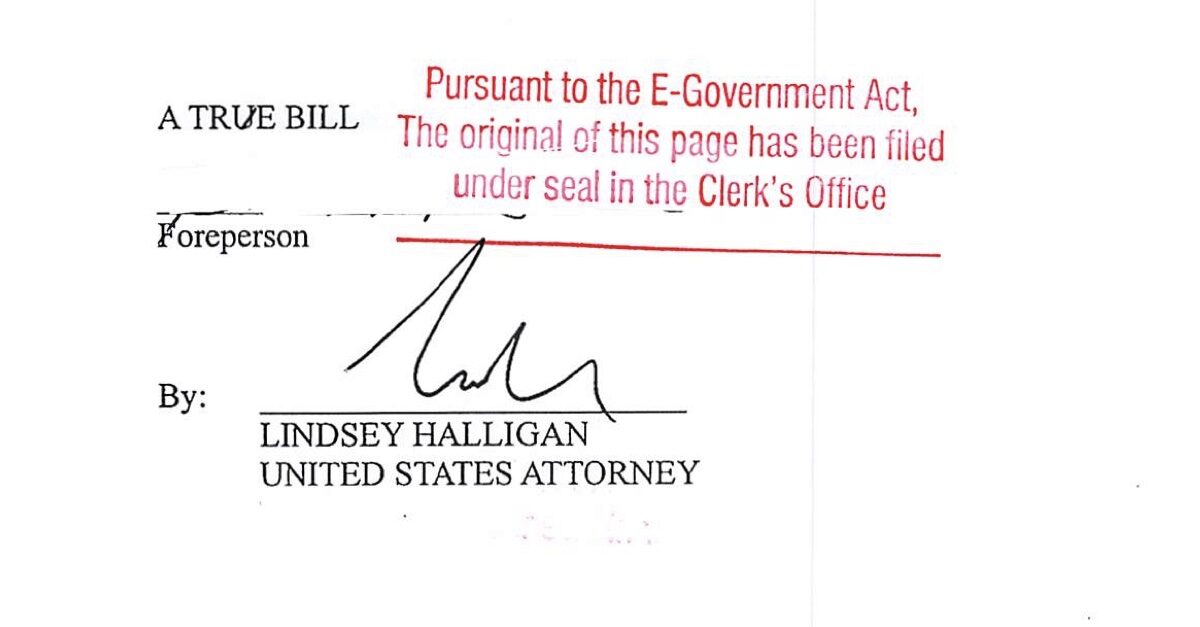
Lindsey Halligan was the only prosecutor to sign James Comey’s indictment (court documents).
In Bolton’s case, on the other hand, the indictment was brought under U.S. Attorney for the District of Maryland Kelly O. Hayes, who was appointed by a federal court in June. What’s more, Hayes was joined by career prosecutors in signing the indictment, including Assistant U.S. Attorney Thomas M. Sullivan, the chief of the National Security and Cyber Section of the office:
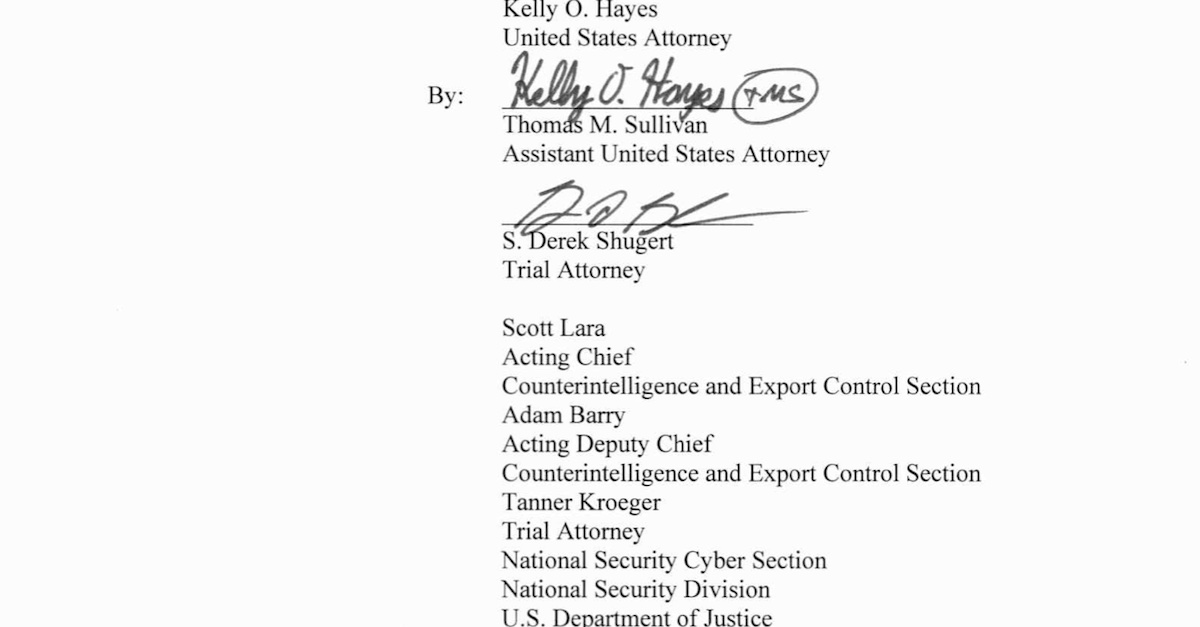
The signature block of the John Bolton indictment with multiple career prosecutors on the case (court documents).
University of North Carolina criminal law Prof. Carissa Byrne Hessick additionally noted that the investigation of Bolton “predates Trump taking office” and apparently involves “large amounts of classified material[.]”
For folks saying the Bolton indictment is political revenge:
1) these charges came from the MD US Atty’s office—which is led by a career prosecutor
2) the investigation predates Trump taking office
3) the indictment suggests large amounts of classified material were involved— Carissa Byrne Hessick (@CBHessick) October 17, 2025
“To be clear—the fact that Trump has called for Bolton to be charged is highly inappropriate. It undermines the public legitimacy of the charges,” she wrote Friday on X. “But that doesn’t mean the charges should not have been brought. To the contrary, there are good reasons to think the opposite.”
But the Bolton case won’t be without its challenges or larger implications for top officials’ diary-writing, in the view of national security attorney Bradley Moss.
“I have read the Bolton indictment. I am thoroughly unimpressed by these allegations. If this manages to make it to trial and a conviction, DOJ just opened a Pandora’s Box for future Administrations to go all out after all senior officials’ handwritten notes every time there is a change in power,” Moss warned.
Bolton’s handling of classified information sparked a federal judge’s concern as far back as 2020
In 2020, when the Trump administration sued Bolton to block the release of his book ahead of the election, Ronald Reagan-appointed Senior U.S. District Judge Royce Lamberth made a harsh assessment of Bolton’s conduct, even as the jurist declined to “order a nationwide seizure and destruction of a political memoir” through a prior restraint.
Lamberth went so far as to say that Bolton “gambled with the national security of the United States,” and “exposed his country to harm and himself to civil (and potentially criminal) liability.”
“[T]he Court is persuaded that Defendant Bolton likely jeopardized national security by disclosing classified information in violation of his nondisclosure agreement obligations,” the judge said at the time. “Bolton […] rushed to write an account of his behind-closed-doors experiences and produced over 500 pages of manuscript for review. Not four months later, Bolton pulled the plug on the process and sent the still-under-review manuscript to the publisher for printing.”
What Bolton and his lawyer have said
Bolton, who pleaded not guilty to the charges Friday, said that his legal peril is directly traceable to Trump’s “retribution” campaign over “The Room Where It Happened.”
“Now, I have become the latest target in weaponizing the Justice Department to charge those he deems to be his enemies with charges that were declined before,” he added, calling the prosecution an “abuse” of Trump’s power.
Bolton attorney Abbe Lowell, who also represents Letitia James, similarly said the “underlying facts in this case were investigated and resolved years ago,” appearing to allude to public reporting that a DOJ criminal investigation of Bolton was closed during the Biden administration in 2021.
“These charges stem from portions of Amb. Bolton’s personal diaries over his 45-year career – records that are unclassified, shared only with his immediate family, and known to the FBI as far back as 2021,” Lowell said. “Like many public officials throughout history, Amb. Bolton kept diaries — that is not a crime. We look forward to proving once again that Amb. Bolton did not unlawfully share or store any information.”
